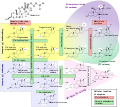Pregnenolone: Difference between revisions
mNo edit summary |
CSV import |
||
| Line 66: | Line 66: | ||
[[Category: Endocrinology]] | [[Category: Endocrinology]] | ||
{{stub}} | {{stub}} | ||
<gallery> | |||
File:Steroidogenesis.svg|Pregnenolone | |||
</gallery> | |||
Latest revision as of 01:17, 20 February 2025
Pregnenolone[edit]

Pregnenolone is an endogenous steroid hormone that serves as a crucial precursor in the biosynthesis of several other steroid hormones. Derived from cholesterol, it plays a fundamental role in the steroidogenic pathway and contributes to a myriad of physiological processes in the body.
Chemistry and Synthesis[edit]
Pregnenolone's chemical classification categorizes it as a steroid, with its structure being based on a cyclopentanoperhydrophenanthrene ring. Its synthesis commences in the mitochondria of steroid-producing cells, where cholesterol undergoes conversion to pregnenolone through the action of the enzyme cytochrome P450scc (cholesterol side-chain cleavage enzyme).
Role and Function[edit]
As a prohormone, pregnenolone is vital for the synthesis of various hormones:
- Progesterone: A key hormone involved in the menstrual cycle, pregnancy, and embryogenesis in humans.
- Corticosteroids: Hormones related to the immune response and regulation of inflammation.
- Mineralocorticoids: Hormones that regulate salt and water balance.
- Androgens and estrogens: The main sex hormones in males and females, respectively.
Besides serving as a precursor for other hormones, recent studies suggest that pregnenolone may have its own set of neuroprotective properties, and its potential role in memory and cognitive functions is being explored.
Clinical Significance[edit]
Alterations in pregnenolone levels can indicate disruptions in the steroidogenic pathway. Some conditions associated with pregnenolone variations include:
- Congenital Adrenal Hyperplasia (CAH): A group of inherited disorders affecting the adrenal glands.
- Polycystic Ovary Syndrome (PCOS): A hormonal disorder causing enlarged ovaries with small cysts on the outer edges.
- Certain types of adrenal tumors.
Additionally, pregnenolone is sometimes used in supplemental form to address fatigue, enhance memory, or alleviate symptoms of arthritis, though scientific evidence supporting these uses is limited.
Safety and Side Effects[edit]
Like all hormones, balance is key. While the body tightly regulates pregnenolone production, supplemental intake might lead to side effects such as:
- Insomnia
- Overstimulation
- Headaches
- Heart palpitations
Before using pregnenolone supplements, it is advisable to consult with a healthcare professional to discuss potential risks and benefits.
See Also[edit]
References[edit]
<references/>
- Miller, W. L. (2013). The Synthesis and Metabolism of Pregnenolone. Journal of Steroid Biochemistry.
- Johnson, M. (2018). Pregnenolone: Its Effects and Uses. Health Perspectives Quarterly.



